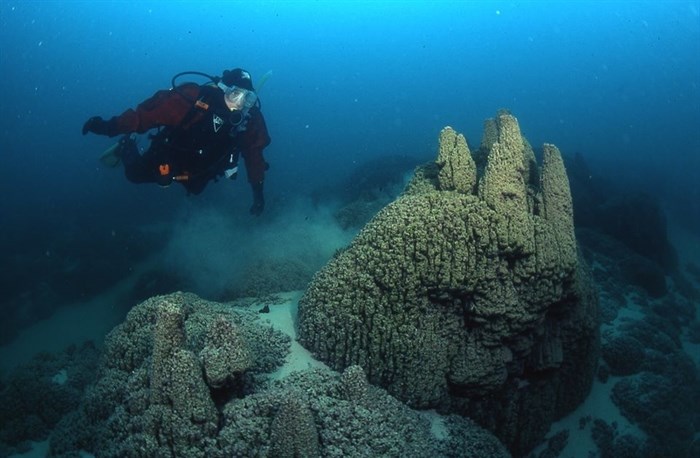
Diver with coral-like structures in Pavilion Lake, taken by Donnie Reid.
Image Credit: FACEBOOK / The Pavilion Lake Research Project
June 29, 2020 - 7:00 AM
One of the most unique lakes in the world is right here in B.C.
Located 40km northwest of Cache Creek in Marble Canyon Park, Pavilion Lake is known for being one of the only lakes with freshwater coral.
However, while these growths are certainly unique, they are not coral at all.
About 20 years ago, one of Dr. Louis Gosselin's students brought him what they thought was a sample of the freshwater coral from Pavilion Lake for him to identify.
"I was puzzled, because it looked like a coral," the marine ecologist said.
"Normally a coral has a bunch of shells, but when you move the shells there's a live animal inside. But there was none of that. There was no animal anywhere in it."
After doing some research, he discovered that these structures are in fact bacterial growths, not coral.
"These are little bacteria that grow and they produce a sticky substance and tiny little sand grains will stick to them," he said.
Over thousands of years, the material accumulated to form coral-like structures with branching columns and turrets on the bottom of Pavilion Lake.
These structures are called microbialites, and they are mainly composed of fossilized remains of micro-organisms.
One reason why these structures are so rare is because they require specific environmental conditions to survive.
"Pavilion Lake is quite deep, and it's also enclosed in a valley, so winds don't tend to churn up the lake very much," Gosselin said.
"When the winds are churning over a lake in a storm, it can move water enough that it would either damage or completely bury these little bacteria."
The mineral content in the water also plays a role, as it creates an optimal environment to promote the bacteria's growth.
According to a report from B.C. Parks, the microbialites found in Pavilion Lake are the largest known to form in freshwater. There are smaller structures forming in Kelly Lake nearby, but these microbialites are less than one meter in size. By comparison, the structures in Pavilion Lake range from one centimetre to three meters.
The oldest and largest microbialites began forming roughly 11,000 years ago and grow at extremely slow rates, according to the report. Some structures only grow about three cm every thousand years.
The shape of the microbiolites varies from cones to mounds resembling artichokes.
B.C. Parks has identified the structures in Pavilion Lake as globally significant and put measures in place to protect them.
"It's quite unique, there are people who come from quite far off to study (them)," Gosselin said.
Notably, NASA and the Canadian Space Agency conducted research for over a decade in Pavilion, Kelly and several surrounding lakes. The goal of the project was to explain the origins of the microbialites, which represent some of the earliest life on ancient Earth. These findings may inform further research on microbial life forms on other planets.
The lake also attracts divers, and was identified by B.C. Parks as one of the primary freshwater attractions for scuba diving in the province.
Because it is a protected area, some activities are not permitted at Pavilion Lake, including removal of the microbialites and fishing practices that may damage the lake bottom.
— This story was corrected at 4:00 p.m. Thursday, July 2, 2020 to clarify that the microbialites found in Kelly Lake are one meter or less in size, and that NASA has conducted research in Pavilion, Kelly and several surrounding lakes.
To contact a reporter for this story, email Brie Welton or call (250) 819-3723 or email the editor. You can also submit photos, videos or news tips to the newsroom and be entered to win a monthly prize draw.
We welcome your comments and opinions on our stories but play nice. We won't censor or delete comments unless they contain off-topic statements or links, unnecessary vulgarity, false facts, spam or obviously fake profiles. If you have any concerns about what you see in comments, email the editor in the link above.
News from © iNFOnews, 2020